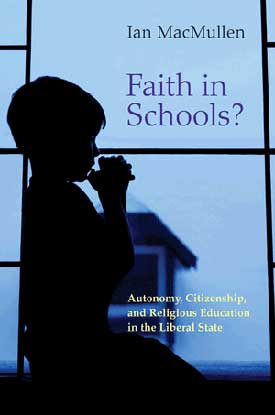Arguing that democratic principles do not support a strict separation of church and state in educational policy, a new book contends that government has both the responsibility to pay for religious schools and the right to regulate what’s taught within them.
“There is no justification for policies, such as we find in America, whereby rich parents are virtually unconstrained in choosing a religious school for their child while poor families are stuck with the state-funded secular schools,” says Ian MacMullen, a British-born political philosopher with degrees from Oxford and Harvard universities.

“The bottom line,” says MacMullen, “is that democracies cannot have it both ways. If faith-based schools meet reasonable public requirements for the education of children, then governments should be willing to support them with tax dollars. If they don’t, they shouldn’t be allowed to operate on anyone’s dime.”
MacMullen, an assistant professor of political science in Arts & Sciences at Washington University in St. Louis, is the author of “Faith in Schools? Autonomy, Citizenship, and Religious Education in the Liberal State” (Princeton University Press, 2007).
MacMullen notes that the debate over religious schools is highly charged, as we should expect on a policy question that raises such a potent cocktail of issues: salvation, segregation, indoctrination, the rights of parents, and the values of tolerance and mutual respect.
Sure to spark controversy from both the left and the right, the book rises above these often-emotional reactions to provide readers a meticulously reasoned framework for evaluating the proper role of government in schooling. Rather than rehash conflicting viewpoints on constitutional intent or political expediency, he offers a strong theoretical foundation for educational policy solutions that best express core democratic principles.
While America draws a hard line between public money and religious activities, MacMullen notes that many other democracies routinely provide substantial funding for faith-based schools. In his native Great Britain, which still has an established church, the government funds a range of faith schools, including Catholic, Methodist, Jewish, Sikh, and, most recently, Muslim. In France and some provinces of Canada, large quantities of public money flow to Catholic schools; in the Netherlands, all religions are equally entitled to public funding for their schools.
By contrast, in the United States, despite a powerful movement in favor of “voucher” schemes that would enable children to attend private religious schools at public expense, most Americans who send their children to religious schools pay for “the privilege,” all the while contributing their tax dollars for public education.

In one of the most innovative sections of the book, MacMullen draws on developmental psychology to suggest that issues of faith in schools should be approached in different ways as student move from elementary to secondary education.
In elementary education, he argues, schools that reflect the beliefs and values of the child’s family may play an important role in helping very young children learn to live consistently within a framework of ethical principles.
However, as these same students mature intellectually and move into secondary schools, the government has an overriding responsibility to ensure that each child receives a robust exposure to the ideas of other religions, to atheism and to nonreligious approaches to ethics.
This experience, he argues, helps children prepare for citizenship in a multi-religious society, while furthering their development as independent and critical thinkers.
“Religious schools are central to the upbringing certain parents seek to give their children, but they may also pose a threat both to the civic health of the state and to the embryonic autonomy of children,” he writes.
“If we are to find a just and principled solution to this controversy, rather than merely deferring in each country to the most powerful political lobby or to the uncertain authority of historical precedent, we shall need reasoned answers to some fundamental questions in political and educational theory.”
Editor’s Note: Review copies of the book may be requested from the publisher; contact Jessica Pellien, Princeton University Press: (609) 258-7879; jessica_pellien@press.princeton.edu.